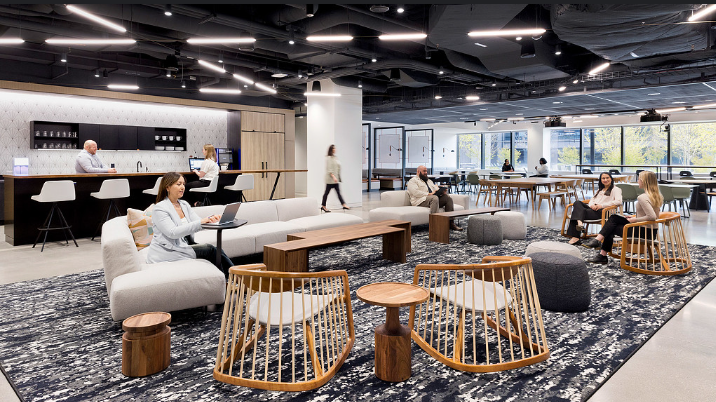In the evolving landscape of workspaces, businesses are increasingly focused on optimizing environments to enhance employee productivity and well-being. Traditional office designs are rapidly giving way to flexible, dynamic setups that cater to different working styles. One of the most innovative solutions in this realm is the office pod—a self-contained, modular space that fosters focus and concentration. As we move forward, the integration of office pods, along with strategic use of office furniture, is transforming the way we work, making offices more adaptable to modern demands.
Adapting to New Workplace Needs
With the rise of remote work and hybrid models, the way employees interact with physical workspaces has changed. While open-plan offices were once hailed for encouraging collaboration, they have also come under scrutiny for contributing to distractions. Office pods offer an alternative, addressing these distractions by providing quiet, personal spaces within a shared environment.
For tasks that require deep focus, office pods serve as a refuge from the noise and bustle of open areas. Their design helps limit interruptions, making them ideal for employees who need to work on high-concentration tasks, video calls, or private meetings. Office pods are also flexible in nature—able to be placed in different locations and easily moved or adjusted as per the company’s changing needs.
Creating a Balance Between Collaboration and Focus
While collaboration is essential to innovation, the ability to focus remains equally important. Many companies have struggled to strike a balance between open spaces for teamwork and quiet areas for individual work. Office pods offer a solution by seamlessly blending both needs within the same workspace.
By placing office pods strategically in open offices, businesses can create a more balanced environment. Team members can work together in common areas, but when focus or privacy is required, they can retreat to a pod. This flexibility in space management allows employees to choose where and how they work, leading to higher satisfaction and productivity.
Enhanced Acoustics and Privacy
One of the most significant benefits of office pods is their ability to control acoustics. Noise is one of the biggest barriers to productivity in open-plan offices. Studies have shown that even moderate levels of ambient noise can reduce focus and negatively impact work quality. Office pods are often soundproof or equipped with noise-reducing materials, offering a quiet sanctuary for workers.
In addition to acoustic benefits, office pods provide visual privacy, which is crucial in today’s collaborative environments. Employees often need to discuss sensitive information, and the ability to step into a pod for a confidential conversation fosters trust and security in the workplace.
The Impact on Employee Well-Being
A well-designed workspace can have a profound impact on employee well-being. Office pods, paired with ergonomic office furniture, help reduce stress by offering a quiet place to recharge during the day. In a busy office environment, having access to a calm, private space can reduce feelings of overwhelm and burnout.
The ability to choose where one works based on the task at hand also improves the overall work experience. Employees can switch between collaborative spaces, common areas, and pods, depending on what suits their needs. This choice not only boosts productivity but also enhances job satisfaction.
Moreover, the modular nature of office pods allows businesses to create workspaces that cater to diverse employee needs, including quiet zones for introverts and private spaces for those with sensory sensitivities.
Customizable and Sustainable Design
Another compelling advantage of office pods is their customizability. From size and shape to interior design elements like lighting, ventilation, and office furniture, pods can be tailored to fit the specific requirements of a company. This flexibility ensures that the pods are not just functional but also aesthetically aligned with the broader workspace design.
Many companies are also prioritizing sustainability in their office designs. Office pods, often made from eco-friendly materials, align with this trend. Modular construction reduces waste, and many pods are built with energy efficiency in mind, contributing to a company’s green initiatives.
Maximizing Real Estate Efficiency
As companies look to optimize their physical office spaces, especially with the rise of hybrid work models, maximizing real estate becomes a priority. Office pods allow businesses to use space more efficiently. Rather than dedicating large areas to meeting rooms that might only be used occasionally, smaller pods can be installed to provide flexible spaces that meet various needs without taking up excessive square footage.
This adaptable approach to space planning is especially beneficial in urban offices, where real estate costs are high. Office pods provide businesses with a cost-effective way to create private and quiet areas without the need for permanent, expensive renovations.
Technology Integration for Modern Workspaces
Technology is a key component of the modern office, and office pods are designed with this in mind. Many office pods are equipped with power outlets, USB charging ports, and advanced ventilation systems. Some even come with built-in monitors and video conferencing equipment, making them ideal for virtual meetings and remote collaboration.
These tech-ready pods ensure that employees have everything they need to work efficiently without leaving their workspace. As more companies embrace digital tools and remote communication, the demand for pods with integrated technology will continue to grow.
The Future of Office Pods in Hybrid Work Environments
As hybrid work models become the norm, the role of office pods will likely expand. Many employees now divide their time between home and the office, making flexible workspace solutions more important than ever. Office pods can be adapted to suit a variety of uses, from meeting spaces to individual workstations, and can be relocated as needs evolve.
In the future, we may see even more advanced pods that incorporate elements of wellness, such as adjustable lighting, air purification systems, and customizable temperature controls. These innovations will further enhance the ability of office pods to support focus and productivity.
Conclusion
Office pods represent the future of workspaces, providing a versatile solution that enhances focus, productivity, and well-being. As companies continue to adapt to changing work environments, the combination of innovative office furniture and modular spaces like office pods will play a critical role in shaping the offices of tomorrow. From offering quiet zones for concentration to optimizing real estate use, office pods are set to redefine how we think about workspaces in the years to come.












